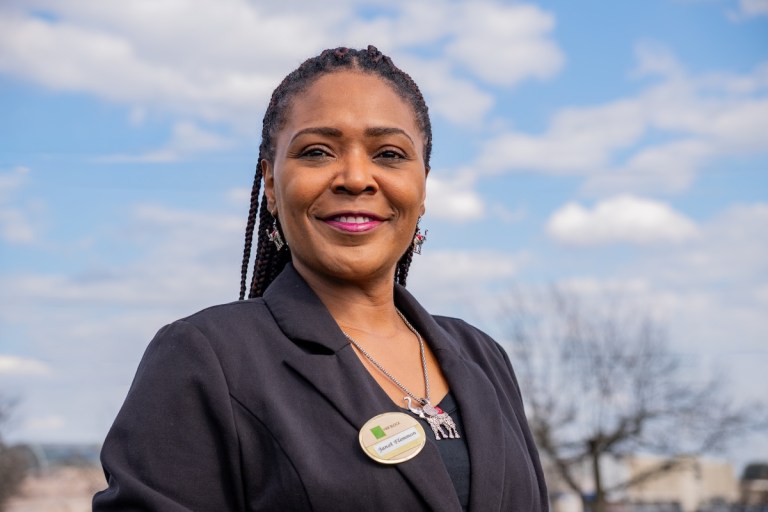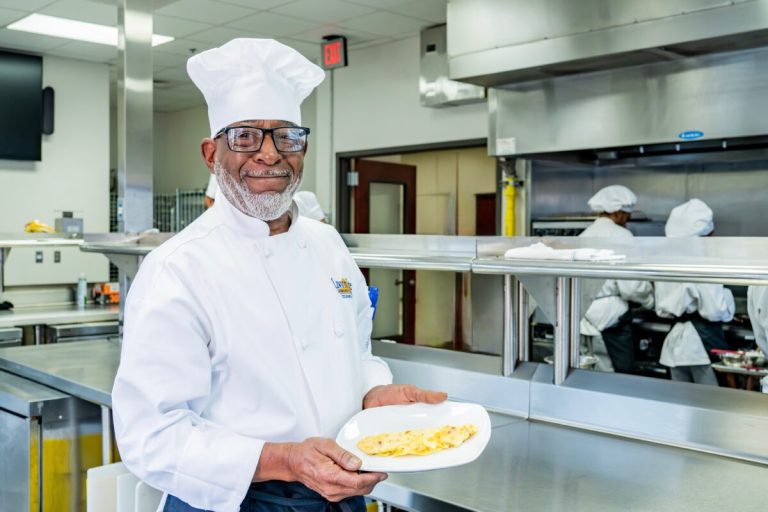Reviewed by: Sharron Swain
This remarkable student knits, learns languages + debunks Poultry Science myths
Reading time: 5 minutes
Sponsored

Kyndal Staley can tell you phrases in three different languages, knit intricate blankets and explain the complex science behind the poultry industry.
Read on to learn why she decided to change her major to Poultry Science and to discover the impressive opportunities the field offers.
Meet Kyndal

Kyndal is a senior Auburn Agriculture student who loves learning new things. In her free time, she enjoys picking up tidbits of different languages and can tell you numerous phrases in German, Spanish and Portuguese.
She’s also involved in campus life, serving as the president of her sorority, Zeta Phi Beta. When not studying agriculture or taking on leadership positions, she enjoys knitting. She’s made multiple blankets for friends and family and is currently working on a large comforter.
Why she chose Poultry Science

The poultry science industry is Kyndal’s passion, but it’s not where she started.
Kyndal grew up south of Montgomery in Brantley, Alabama, and first attended college at Lurleen B. Wallace Community College to study Biomedical Sciences. Two years later, she knew she wanted to transfer to a larger school but had no intention of changing her path of study.
Yet, one day, she connected with her former high school agriculture teacher and learned about the exceptional career opportunities in Poultry Science. She then knew where she needed to transfer—Auburn University’s College of Agriculture.
Large campus, small classes
Kyndal has loved enjoying the perks of attending a large school while benefiting from the College of Agriculture’s small class sizes.
“Because the classes are small, there’s a better connection between the professors and the students. Many of the professors get you to work with other students and simulate real-world scenarios. So when you actually get into the industry or getting to the job force, you’re going to be prepared to work with other people and problem solve.”
Kyndal Staley, Poultry Science major, Auburn University
When Kyndal first stepped on Auburn’s campus, she planned to go down the pre-vet path but changed her focus to production after taking some of her favorite Poultry Science classes.
“When I took Dr. Jessica Starkey’s Commercial Production class, I knew I wanted to pursue the production path with Poultry Science. I loved experiencing the hands-on side of the industry.”
Kyndal Staley, Poultry Science major, Auburn University
Do you love a large-campus feel with small-campus benefits? Check out Auburn College of Agriculture and discover why Poultry Science may be the career for you.
Debunking common myths

While studying Poultry Science, Kyndal has had the opportunity to debunk myths commonly associated with the poultry industry.
The biggest myth I’ve seen debunked is the concept of putting hormones in chickens to make them grow larger. When I entered the Poultry Science program, I wasn’t sure if it was true or not. But after actually working in production, I’ve seen firsthand how it’s false.”
Kyndal Staley, Poultry Science major, Auburn University
Auburn University describes their agricultural studies as applied sciences, and Kyndal’s learnings are a testament to this. Although some people may view the poultry industry as only hands-on and practical, every aspect comes down to intricate science.
“Every aspect of Poultry Science comes down to a basic science, from the food you give the birds to how long you have them and how you manage the light and temperature of the room. We focus on microbiology throughout the production phase to ensure the birds don’t have diseases and the meat is in proper condition.”
Kyndal Staley, Poultry Science major, Auburn University
Job placement is outstanding in the poultry industry. Learn more about Auburn’s Poultry Science department.
Diverse + lucrative career opportunities

Before joining Auburn’s College of Agriculture, Kyndal had a limited understanding of the career opportunities in the poultry science field.
She grew up driving by homes with chicken houses in the backyard but never realized the intricate science involved in getting the bird from house to plate.
Plus, she never knew about the diverse range of high-paying jobs one could pursue with a Poultry Science degree. Check out Auburn University’s program and the industry at a glance:
- 100% job placement rate into the Poultry Science industry for Auburn University students.
- Over $120,000 in scholarships awarded to Auburn Poultry Science students.
- $50,000 to $60,000 is the average starting salary for a Poultry Science graduate.
- 200,000 square feet of research space in the Auburn Poultry Science department.
- Poultry jobs can include working for feed and product development companies or entering science and technology fields, such as pharmaceuticals.
“There’s so much you can do with Poultry Science. You can work in business development, sales and research or be more hands-on with the production industry. I was shocked by the amount of opportunities the field offered.”
Kyndal Staley, Poultry Science major, Auburn University
Upon graduation, Kyndal plans to pursue a research and product development role in the poultry industry.
The demand and pay are high for jobs in the poultry science industry. Learn more about Auburn’s Poultry Science department today.
Sponsored by:





